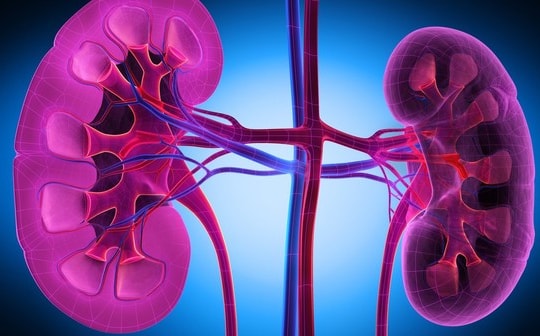Abnormalities in the body warn of impaired kidney function
Chronic kidney disease often develops silently, worsens over time, and is irreversible. In the early stages of the disease, you may have few signs or symptoms.
According to statistics, the rate of kidney failure (chronic kidney disease) in Vietnam accounts for about 10% of the population (more than 10 million people), with about 8,000 new cases each year.
Kidney failure is a condition of decreased kidney function. Kidney failure includes acute kidney failure and chronic kidney failure. Chronic kidney failure often develops silently, worsens over time and cannot be reversed.
Treatment focuses on slowing the progression of kidney damage, often by controlling the cause. However, even controlling the cause may not stop the kidney damage from progressing. The disease can progress to end-stage kidney failure, which is fatal without dialysis or a kidney transplant.

Chronic kidney failure often develops silently, worsens over time and cannot be reversed. Illustration: Hospital
Causes of kidney failure
According to Dr. Luong Minh Tuyen - Deputy Head of the Department of Dialysis, Bai Chay Hospital (Quang Ninh), kidney failure has many causes. In which, acute kidney failure is divided into 3 main groups of causes of kidney failure including pre-renal, renal, and post-renal.
The pre-renal group of patients includes groups of causes that reduce blood flow to the kidneys, causing a decline in filtration function such as dehydration due to heat, frequent diarrhea and vomiting. The group of causes in the kidneys causes renal tubular necrosis, reducing kidney function such as infection, poisoning, etc.
Postrenal renal failure due to urinary tract obstruction causes urine retention, renal pelvis dilation and renal failure, often seen in urinary stones, cancer, prostate enlargement...
Meanwhile, chronic renal failure is the process of gradual death of nephron cells, due to many causes such as glomerulonephritis, cardiovascular and endocrine diseases (hypertension, diabetes), autoimmune diseases such as lupus erythematosus, scleroderma..., genetic diseases (polycystic liver and kidney...).
Signs of kidney failure
Signs of kidney failure are easily confused with other diseases of the urinary tract. Therefore, people need to have the knowledge to recognize early to proactively visit, receive advice and timely and proper treatment, preventing dangerous complications.
Signs of kidney failure include:
-Skin symptoms
In patients with kidney failure, the skin is often dark and dull due to the deposition of many toxins and iron. Patients may also have signs of anemia, so the skin is often pale, dull, and lifeless.
-Symptoms of anemia
Kidney failure causes chronic anemia, so patients have symptoms of anemia such as pale skin and mucous membranes, dizziness, and fatigue at work.
-Symptoms of increased blood urea
Patients have symptoms of urea breath, poor appetite and anorexia, fatigue, sometimes headache, nausea, dizziness
-Symptoms of high blood pressure
Patients with renal failure often have concomitant hypertension, or hypertensive crises, blood pressure is often high > 180mmHg, and responds poorly to antihypertensive drugs.
-Symptoms of edema
This is one of the common causes of acute renal failure and acute episodes of chronic renal failure. Patients urinate in small amounts with edema in the lower region.
In addition, patients with kidney failure also have many atypical symptoms such as bone and joint pain, bilateral lumbar pain, etc.
Due to lack of awareness of the disease, many patients with severe kidney failure are admitted to the hospital. At that time, the patient has swelling in body parts such as eyes, legs and arms..., life-threatening due to the kidney's reduced ability to remove water and salt.
Similarly, according toMayo Clinic, signs and symptoms of the disease develop over time if kidney damage progresses slowly. Loss of kidney function can cause a buildup of fluid or body waste or electrolyte problems.
Depending on the severity, loss of kidney function can cause nausea, vomiting, loss of appetite, fatigue and weakness, sleep problems, increased or decreased urination, mental decline, muscle cramps, swelling of the feet and ankles, dry itchy skin, uncontrolled high blood pressure, difficulty breathing if fluid builds up in the lungs, chest pain if fluid builds up around the heart
BYou may not realize you have the disease until it has progressed. The signs and symptoms of kidney disease are often nonspecific. This means they can also be caused by other diseases.
Because your kidneys can compensate for lost function, you may not develop signs and symptoms until irreversible damage occurs.




